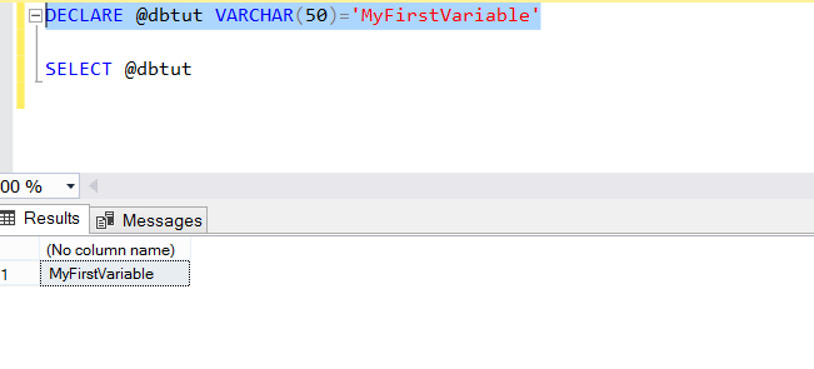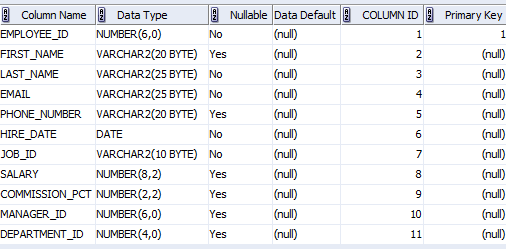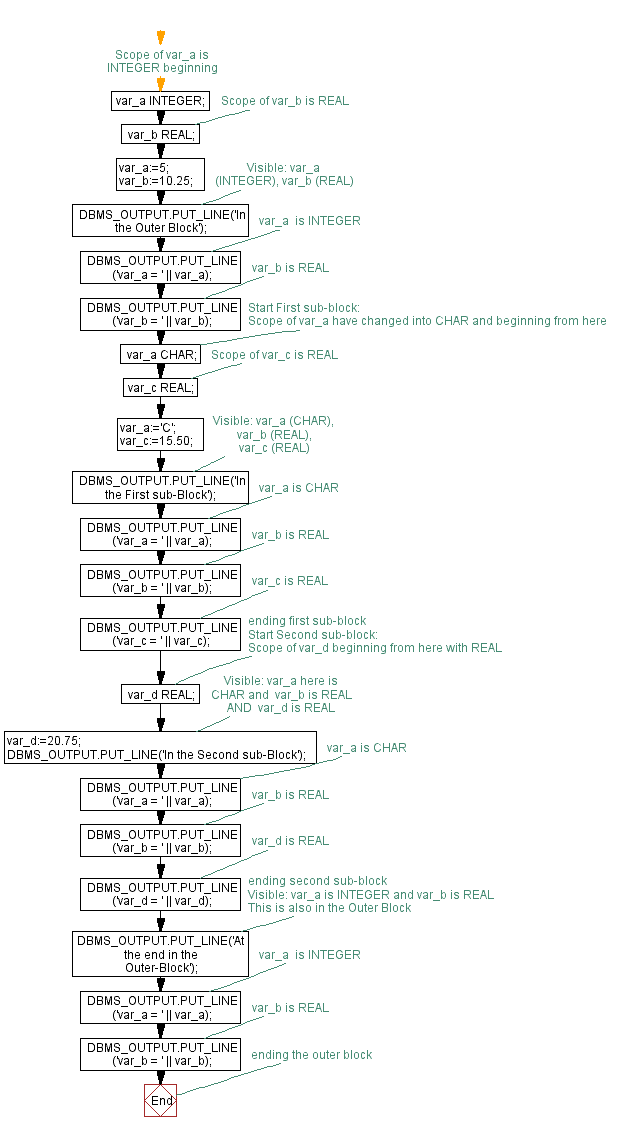An nameless PL/SQL block is a basic, unnamed unit of a PL/SQL program. It consists of a set of SQL or PL/SQL statements to carry out a logical function. In this lesson, you've gotten discovered the right way to declare variables within the declarative section. You have seen a number of the rules for declaring variables. You have discovered the right way to initialize variables if you declare them.
The executable half is the obligatory a half of a PL/SQL block, and consists of SQL and PL/SQL statements for querying and manipulating data. In this lesson, you've discovered ways to initialize variables within the executable half and in addition ways to make the most of them and manipulate the values of variables. The %TYPE attribute is used to declare variables in response to the already declared variable or database column. It is used if you find yourself declaring a private variable, not a record. The info style and precision of the variable declared making use of %TYPE attribute is identical as that of the column that's referred from a given table. This is especially helpful when declaring variables which will maintain database values.
When employing the %TYPE keyword, the identify of the columns and the desk to which the variable will correspond should be identified to the user. If some earlier declared variable is referred then prefix that variable identify to the %TYPE attribute. By default, saved procedures and SQL strategies execute with the privileges of their owner, not their existing user. Such definer's rights subprograms are sure to the schema wherein they reside, permitting you to consult objects within the identical schema with out qualifying their names. For example, if schemas HR and OE equally have a desk referred to as departments, a process owned by HR can seek advice from departments fairly then HR.departments.
If consumer OE calls HR's procedure, the process nonetheless accesses the departments desk owned by HR. Later within the block section, we've got referred to as the PL / SQL variables employing the SELECT command and assigned them with values employing INTO command. We even have declared the table's name, outlined what files to extract, and displayed it. You can declare variables within the declarative component of any PL/SQL block, subprogram, or package.
Declarations allocate area for storing for a value, specify its information type, and identify the storage location as a way to reference it. Declarations may additionally assign an preliminary worth and impose the NOT NULL constraint on the variable. You ought to declare a variable earlier than referencing it in different statements, which include different declarative statements. As a procedural language by definition, PL/SQL can grant a number of iteration constructs, which include standard LOOP statements, WHILE loops, FOR loops, and Cursor FOR loops. Since Oracle 7.3 the REF CURSOR style was launched to permit recordsets to be returned from saved procedures and functions.
Oracle 9i launched the predefined SYS_REFCURSOR type, which means we not should outline our personal REF CURSOR types. The primary unit of a PL/SQL supply program is the block, which teams mutually associated declarations and statements. A PL/SQL block is outlined by the important thing phrases DECLARE, BEGIN, EXCEPTION, and END. These key phrases divide the block right into a declarative part, an executable part, and an exception-handling part. The declaration half is elective and should be used to outline and initialize constants and variables.
If a variable seriously is not initialized then it defaults to NULL value. The elective exception-handling half is used to manage run time errors. Here on this program, we've got declared two-variables n_numG1 and n_numG2 with a knowledge sort of VARCHAR2 with a most size of 40. A second variable with the info sort of wide variety and assigned 2 values to each the variables, respectively.
These variables are outlined within the worldwide scope, they usually are often used anyplace within the program. Later we now have assigned a PL / SQL block and referred to as the worldwide variable to monitor the output. Bind variables are created within the surroundings and never within the declarative part of a PL/SQL block. Variables declared in a PL/SQL block could be found solely if you execute the block. After the block is executed, the reminiscence utilized by the variable is freed.
However, bind variables are accessible even after the block is executed. Therefore, when created, bind variables should be utilized and manipulated by a number of subprograms. They should be utilized in SQL statements and PL/SQL blocks identical to another variable. These variables should be exceeded as run-time values into or out of PL/SQL subprograms.
You needn't change the variable declaration if the column definition changes. When you employ the %TYPE attribute, PL/SQL determines the info sort and measurement of the variable when the block is compiled. This ensures that such a variable is usually suitable with the column that's used to populate it. Generally PL/SQL variables are declared to carry and manipulate files saved in a database.
When you declare PL/SQL variables to carry column values, you will need to guarantee that the variable is of the right knowledge kind and precision. If it really is not, a PL/SQL error will appear for the duration of execution. If you need to design full-size subprograms, then this may be time-consuming and error-prone. If you need to design full-size subprograms, this may be time-consuming and error-prone.
As a half of the declaration for every PL/SQL variable, you declare its datatype. Usually, this datatype is definitely one among several varieties shared between PL/SQL and SQL, comparable to NUMBER or VARCHAR2. In this post, you discovered methods to declare variables within the declarative section. You discovered methods to initialize variables once you declare them. The executable a half of a PL/SQL block is the obligatory half and consists of SQL and PL/SQL statements for querying and manipulating data. You discovered methods to initialize variables within the executable half and in addition methods to make use of them and manipulate the values of variables.
When you declare a PL/SQL variable to carry the column values, it should be of right facts sorts and precision, in any different case error will manifest on execution. Rather than arduous coding the info kind and precision of a variable. PL/SQL delivers the power to declare a variable with no having to specify a specific facts kind making use of %TYPE and %ROWTYPE attributes.
These two attributes permit us to specify a variable and have that variable facts variety be outlined by a table/view column or a PL/SQL package deal variable. The method declares three PL/SQL tables as OUT formal parameters, then fetches a batch of worker facts into the PL/SQL tables. When the method finishes, it routinely assigns all row values within the PL/SQL tables to corresponding parts within the host arrays. Bind variables are declared of their host setting outdoors the declared block. They are additionally referred to as host variables or block-free variables. They can quite simply be modified or manipulated by a number of subprograms.
And these bind variables will be declared everywhere on this system and may be referred to as everywhere as they perform much like world scopes as their vary is the entire worksheet. Here on this program, we now have declared a variable V with a knowledge kind of VARCHAR2, and a most size of 50. We have added a worth and later referred to because the variable to monitor the output and compile the equation by giving the output. Here the variable V is said within the worldwide scope, and subsequently we will use variable V everywhere on this system as per our convenience. But the variable V1 is said inside a neighborhood scope; therefore, it could actually solely be used inside native parameters.
When we use the native variable V1 after the END command, it provides us an error. A RECORD variety is simply not a real information type, solely a placeholder. Record variety variables assume the exact row construction of the row that they're assigned for the duration of a SELECT or FOR command.
The substructure of a document variable can change every time it can be assigned a value. Until a document variable is first assigned to, it has no substructure. Any try and entry a subject in it throws a runtime error. With the LOB class of knowledge sorts one could shop blocks of unstructured information as much as four gigabytes in size.
LOB knowledge sorts permit efficient, random, piecewise entry to the info and may be attributes of an object type. Once the variable is declared, they're competent to carry the info of outlined type. The values of those variables might possibly be assigned both in execution half or on the time of declaring itself. The worth might possibly be both a literal or yet another variable's value. Once a specific worth has been assigned, will probably be saved within the allotted reminiscence area for that variable. Therefore, bind variables are accessible even after the block is executed.
When created, bind variables would be utilized and manipulated by a number of subprograms. With the LOB sort of knowledge sorts , you will retailer blocks of unstructured statistics of as much as 128 terabytes counting on the database block size. LOB statistics sorts permit efficient, random, piecewise entry to statistics and may be attributes of an object type.
In PL/SQL program, one among several crucial customary duties is to pick out values from columns in a desk right into a set of variables. In case the info kinds of columns of the desk changes, you must change the PL/SQL program to make the kinds of the variables suitable with the brand new changes. The instance above reveals a standalone method - one among these method is created and saved in a database schema utilizing the CREATE PROCEDURE statement.
A process might even be created in a PL/SQL package deal deal - this is often named a Package Procedure. A process created in a PL/SQL nameless block is named a nested procedure. The standalone or package deal deal procedures, saved within the database, are known as "stored procedures". Subprograms are named PL/SQL blocks that might be referred to as with a set of parameters. PL/SQL has two kinds of subprograms, procedures and functions.
Generally, you make use of a method to carry out an motion and a carry out to compute a value. The refcursor info style is the info sort of cursor variables inside saved procedures. A refcursor worth could be returned from inside a saved procedure. The variable emp_lname is outlined to be of the identical info style because the last_name column within the workers table. The %TYPE attribute offers the info sort of a database column. The %TYPE attribute is most frequently used when the worth saved within the variable might be derived from a desk within the database.
When you employ the %TYPE attribute to declare a variable, you ought to prefix it with the database desk and column name. If you check with a beforehand declared variable, prefix the variable identify to the attribute. Variables are primarily used for storage of knowledge and manipulation of saved values. The fact is retrieving the first_name and department_id from the table. If you need to control the first_name or the department_id, you then need to keep the retrieved value. You can use the worth saved in these variables for processing/manipulating the data.
Therefore, the variables are used for storing and manipulating data. Variables can keep any PL/SQL object comparable to variables, types, cursors, and subprograms. Placeholders are any of variables, constants or information to keep non permanent in storage area. Later you need to use it to control statistics through the execution of a PL/SQL block. The v_emp_lname variable is outlined to be of the identical statistics variety because the last_name column within the workers table. The %TYPE attribute is most frequently used when the worth saved within the variable is derived from a desk within the database.
When you employ the %TYPE attribute to declare a variable,you have to prefix it with the database desk and column name. If you discuss with a previouslydeclared variable, prefix the variable identify of the previously-declared variable to the variable being declared. The PL/SQL compiler have to resolve all references to tables and different objects at compile time. The proprietor of an invoker's rights subprogram have to have objects within the identical schema with the ideal names and columns, even when they don't include any data.
At run time, the corresponding objects within the caller's schema have to have matching definitions. Otherwise, you get an error or unforeseen results, comparable to ignoring desk columns that exist within the caller's schema however not within the schema that comprises the subprogram. Is the identify of the variable or constant; could also be scalar, composite datatype, reference or LOB; is a literal value, an additional variable or any PL/SQL expression. The consequences of the expression is used to assign the default worth of the variable or constant.
If you're defining a constant, you need to supply the worth of the fixed within the definition. TABLE, RECORD, NESTED TABLE and VARRAY are composite types. To outline scalar sort one can discuss with [schema.]object%TYPE or cursor%TYPE.
For report sort you will discuss with [schema.]object%ROWTYPE. PL/SQL permits a number of sorts of knowledge that may be used to declare variables. Optional variables could very well be assigned values in the declaration, and may change the worth by subsequent assignments within the block. You can specify constants and variables within the declarative part of any PL/SQL block, subprogram, or package.
Declarations give worth storage, a datatype, and a reputation that could be referenced. In addition, declarations can set a establishing worth and implement the NOT NULL requirement. Every constant, variable, and parameter has a knowledge kind , which specifies a storage format, constraints, and legitimate selection of values. For instance, possible pick from integer, floating point, character, Boolean, date, collection, and LOB types.
This chapter covers the essential varieties which might be used ceaselessly in PL/SQL programs. Record variables are corresponding to row-type variables, however they've no predefined structure. They tackle the precise row shape of the row they're assigned in the course of a SELECT or FOR command. The substructure of a file variable can change every time it can be assigned to.




















